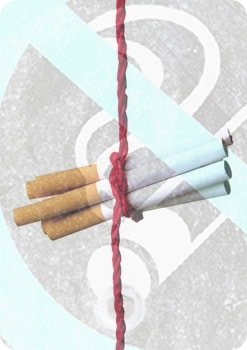May 18 2009
Some cities and states around the country have completely banned smoking in public places. Others have instituted partial bans to avoid negative economic consequences, such as loss of employment in restaurants and bars due to reduced patronage by smokers.
But a new study from Minnesota finds that there is no significant difference between partial bans, complete bans and even no bans, in terms of their impact on number of employees in restaurants and bars.
"This is the first study to compare the economic consequences of partial bans, total bans and no bans on smoking in public places. Because they don't have any differential effect on employment in restaurants and bars, it is obvious that a total ban on smoking is the only way to protect employees and patrons from second hand smoke, which is known to cause lung cancer, heart disease and respiratory diseases" according to study author Elizabeth Klein, Ph.D., MPH, Assistant Professor in the Health Behavior & Health Promotion Division of the College of Public Health at Ohio State University. Klein conducted the study while she was at the University of Minnesota. The study is published in the June issue of Prevention Science, a peer reviewed journal of the Society for Prevention Research.
Klein studied ten cities in Minnesota from 2003 to 2006, using data from the Minnesota Department of Employment and Economic Development. Employment was based on per capita figures to allow comparison among non-urban, small cities, suburban and large cities for a 45-month period. The range of employment in restaurants and bars across the various cities was 467 to 11, 296, and the total number of establishments ranged from 20 to 440 per city.
Communities that had a total ban on smoking in public places had 2 fewer employees per 10,000 residents compared to those without any ban on smoking. They also 9 fewer employees per 10,000 community members compared to communities with partial bans on smoking.
"These differences are not statistically significant, they are not disastrous, and they are not long-term, as are often predicted by opponents of any type of bans on smoking in public places," Klein said.
 "Before Minnesota passed a complete ban on smoking in public places, some communities had complete bans; some had partial bans while others had no bans on smoking in public places. The different types of bans provided a perfect opportunity to study how these laws affected employment in restaurants and bars," according to Klein.
"Before Minnesota passed a complete ban on smoking in public places, some communities had complete bans; some had partial bans while others had no bans on smoking in public places. The different types of bans provided a perfect opportunity to study how these laws affected employment in restaurants and bars," according to Klein.
Klein's study covered free standing bars, which included lounges, taverns and nightclubs; and full service restaurants, which included family style restaurants, fine dining and steak houses.
Klein's paper notes that the concern for the economic health of bars was one of the reasons that led to a rollback of a county level, comprehensive clean indoor air policy in Hennepin County in Minnesota, which includes Minneapolis. The rollback in Hennepin County was eventually reversed by the comprehensive state-level ban on smoking in all public places.
"The fact that large scale changes in employment were not observed in Minnesota should be useful to policy makers across the country as they weigh the known health benefits of bans on smoking in public places against any perceived loss of employment in restaurants and bars," Klein said.